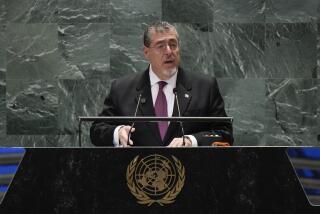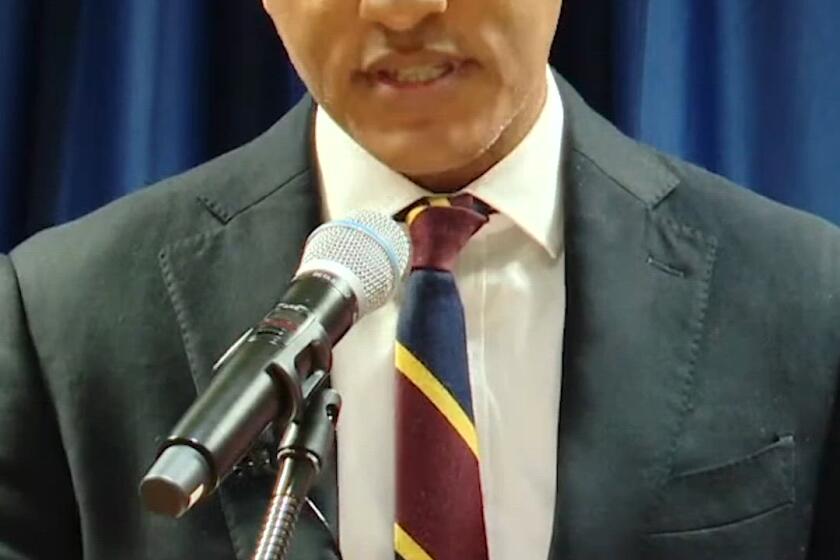Mainland’s Turbulence Elicits Ambivalence : Taiwan View of Beijing: Shock but Detachment
A few days ago, while death sentences were being pronounced against pro-democracy protesters in China, stockbrokers in Taiwan popped champagne corks in celebration of a new market high.
The coincidence of events reflected a crosscurrent of attitudes in Taiwan toward turbulent events on the mainland. Although the attack on Beijing’s Tian An Men Square and its aftermath deeply shocked people here, there was also a sense of detachment.
Students and common citizens, imbued with feelings of kinship and shared history with the mainland, donated blood and money for relief efforts.
No Great Effect
But the problem was viewed as one that would not, after all, greatly effect Taiwan. Nor could Taiwan do much about the situation on the mainland. Talk on the street just as easily turns to the local preoccupation with air pollution as to the plight of Chinese dissidents.
“For most of us, Tian An Men was a televised event. We watched and then went on with our business,” said Zhan Hungzhi, a publisher and author.
Commented one Western observer: “Taiwan looked across and saw this giant thrashing around and decided it was not worth getting too involved.”
Taiwan residents pointed out that this island is not like Hong Kong, which feels the mainland’s breath getting closer--the British colony is scheduled to revert to Chinese rule in 1997.
Fiery Analogy
People here feel confident that their lives will go on uninterrupted for the foreseeable future. “Hong Kong is like a tenant in a building that is on fire. It is screaming for help,” said Edward Yang, a film maker. “Taiwan lives across the street. The fire is compelling, even upsetting, but does not necessarily effect the value of the property.”
The ambivalence of the general populace was shared by Taiwan’s ruling Nationalist government that, being the political bastion of the late Chiang Kai-shek’s Kuomintang organization, bills itself as the archrival and future successor of the Communist government in Beijing.
There was a time when turmoil in China would send hearts aflutter here among Nationalist diehards who dream of taking back the mainland from which they were driven 40 years ago. And a few old-timers did insist that now was the time for the Nationalists to go home.
However, news of trouble in Beijing mostly brought out expressions of timidity rather than predictions of impending triumph.
Although the government found its incessant anti-Communist propaganda chillingly confirmed by the attack on Tian An Men Square, it was not eager to crow about the troubles on the mainland.
Officials appeared to be ill at ease with Taiwan’s being brought into the picture at all. Word last week that China was blaming 13 alleged spies in the service of Taiwan for inciting “counterrevolutionary riots” only increased their anxiety.
“Our worst fear is that we be used as a scapegoat. That is why we restrain ourselves,” said government spokesman Shaw Yuming.
“We specifically avoided making propaganda points,” added Liu Polung, who heads the North American Department of Taiwan’s Foreign Ministry. “All in all it is a time for caution.”
The muted response may also be due to the government’s own record of putting down demonstrations and popular movements, Chinese and foreign observers say. Martial law was in place here for 38 years and was lifted only two years ago.
Hypocrisy Seen
“There was some hypocrisy in the government’s clucking over Tian An Men,” a representative of a Western country said.
Before the killings in Beijing, Taiwan’s government itself mounted demonstrations, keeping them carefully under control lest they turn into local pleas for greater democracy or for outright independence from China.
After the massacre, officials here took 48 hours to fully react and Chinese commentators said that the government was doing too little to support dissidence in China.
The government responded by sending up some balloons to carry newspapers into China and by expanding radio broadcasts beamed at the mainland.
Most wallposters mourning the dead in Beijing are now gone from Taipei’s university campuses. The president of state-run Taipei University ordered a display of posters removed from the school’s front gate, saying that it was unsightly. The banners included some commentary against the Taiwan government.
No one is saying that the turbulence in China has brought the day closer when Taiwan will be reunified with its giant and impoverished cousin across the Formosa Strait. On the contrary, a recent warming trend in relations between Beijing and Taipei appears to be in unofficial suspension.
The government had authorized travel to China for non-government tourists and in May sent an official representative to the Asian Development Bank meeting held in Beijing. For several years, Taiwan had looked the other way as its businessmen traded with and even invested in China.
“As we liberalize, there was an illusion that things would get better quickly,” said Liu from the Foreign Ministry. “Perhaps now we will all have a more sober view.”
The government had recently floated an idea to ease tensions with China: a so-called one country-two governments policy that would put the Nationalists, who control only Taiwan and a few small nearby islands, on a par with the Communists in Beijing.
A proposal was modeled on such split-nationhoods as East and West Germany and North and South Korea.
This idea, too, appears to be a victim of the Tian An Men massacre.
No matter. Taiwan seems to have grown accustomed to--even to have embraced--its strange status as a country fully recognized by only 15 other nations, including such exotic addresses as South Africa, El Salvador and Haiti. The rest of the world either ignores the island or, like the United States and Japan, maintains relations through private front organizations manned by diplomats on leave.
Taiwan lost all this diplomatic status in the 1970s when erstwhile friends rushed to open relations with China, which was beginning to emerge from the shadows of the Cultural Revolution.
Since then, the island has prospered mightily, joining Hong Kong, Singapore and South Korea on the list of “little dragons” that have followed Japan, the Big Dragon, in building impressive economies.
Twenty years ago, Taipei was a sleepy provincial capital. It has now taken on the trappings of a regional powerhouse.
A new theater and a new concert hall have been done in the manner of Qing Dynasty palaces, down to the gold-tiled roofs and giant red pillars. A new railroad station is also being built along the same lines. Glass-encased office buildings are all the rage as well. Traffic is a world-class mess.
So confident are Taiwan residents of their economic future that some experts see gain even from the crisis in China.
“It is my opinion that the impact will be favorable. Business people may transfer purchases and even investment to Taiwan from China,” said Chao Kangyang, who heads the Chinese Economic Institute, a private think tank in Taipei.
Chao considers that flight capital from Hong Kong may have fueled the recent binge on Taiwan’s stock market.
The willingness of Taiwan to brush aside the mainland crisis suggests to some that emotional ties with the mainland may be loosening.
Bo Yang, a writer whose works have at one time or another been banned in both China and Taiwan, noted that many citizens here have visited China and see that there are grave practical differences that will keep the people apart for many years.
“The failure of democracy on the mainland is yet another obstacle. Until Tian An Men, perhaps we who live in Taiwan could think of reunification,” Bo said. “Now it is more difficult.”
Economist Chao, who was born in China, is planning to make a trip there soon to transfer the ashes of his in-laws from the path of a new highway being built near his old hometown in northeastern China.
Would he like to return to spend his future retirement there?
“I have a house in San Luis Obispo,” Chao said. “That is where I would like to live.”
More to Read
Sign up for Essential California
The most important California stories and recommendations in your inbox every morning.
You may occasionally receive promotional content from the Los Angeles Times.










